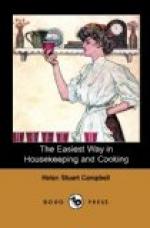Alcohol is last upon our list, and scientific men are still uncertain whether or not it can in any degree be considered as a food; but we have no room for the various arguments for and against. You all know, in part at least, the effects of intemperance; and even the moderate daily drinker suffers from clouded mind, irritable nerves, and ruined digestion.
This is not meant as an argument for total abstinence; but there are cases where such abstinence is the only rule. In an inherited tendency to drink, there is no other safe road; but to the man or woman who lives by law, and whose body is in the best condition, wine in its many forms is a permissible occasional luxury, and so with beer and cider and the wide range of domestic drinks. In old age its use is almost essential, but always in moderation, individual temperament modifying every rule, and making the best knowledge an imperative need. A little alcoholic drink increases a delicate appetite: a great deal diminishes or takes it away entirely, and also hinders and in many cases stops digestion altogether. In its constant over-use the membranes of the stomach are gradually destroyed, and every organ in the body suffers. In ales and beers there is not only alcohol, but much nitrogenous and sugary matter, very fattening in its nature. A light beer, well flavored with hops, is an aid to digestion, but taken in excess produces biliousness. The long list of alcoholic products it is not necessary to give, nor is it possible to enter into much detail regarding alcohol itself; but there are one or two points so important that they can not be passed by.
You will recall in a preceding chapter the description of the circulation of the blood, and of its first passage through veins and arteries for cleansing, before a second round could make it food for the whole complex nervous system. Alcohol taken in excess, it has been proved in countless experiments by scientific men, possesses the power of coagulating the blood. The little corpuscles adhere in masses, and cannot force themselves through the smaller vessels, and circulation is at once hindered. This, however, is the secondary stage. At first, as many of you have had occasion to notice, the face flushes, the eyes grow brighter, and thought and word both come more freely. The heart beats far more rapidly, and the speed increases in proportion to the amount of alcohol absorbed. The average number of beats of the heart, allowing for its slower action during sleep, is 100,000 beats per day. Under a small supply of alcohol this rose to 127,000, and in actual intoxication to 131,000.
The flush upon the cheek is only a token of the same fact within; every organ is congested. The brain has been examined under such circumstances, and “looked as if injected with vermilion ... the membrane covering both brains resembling a delicate web of coagulated red blood, so tensely were its fine vessels engorged.”




